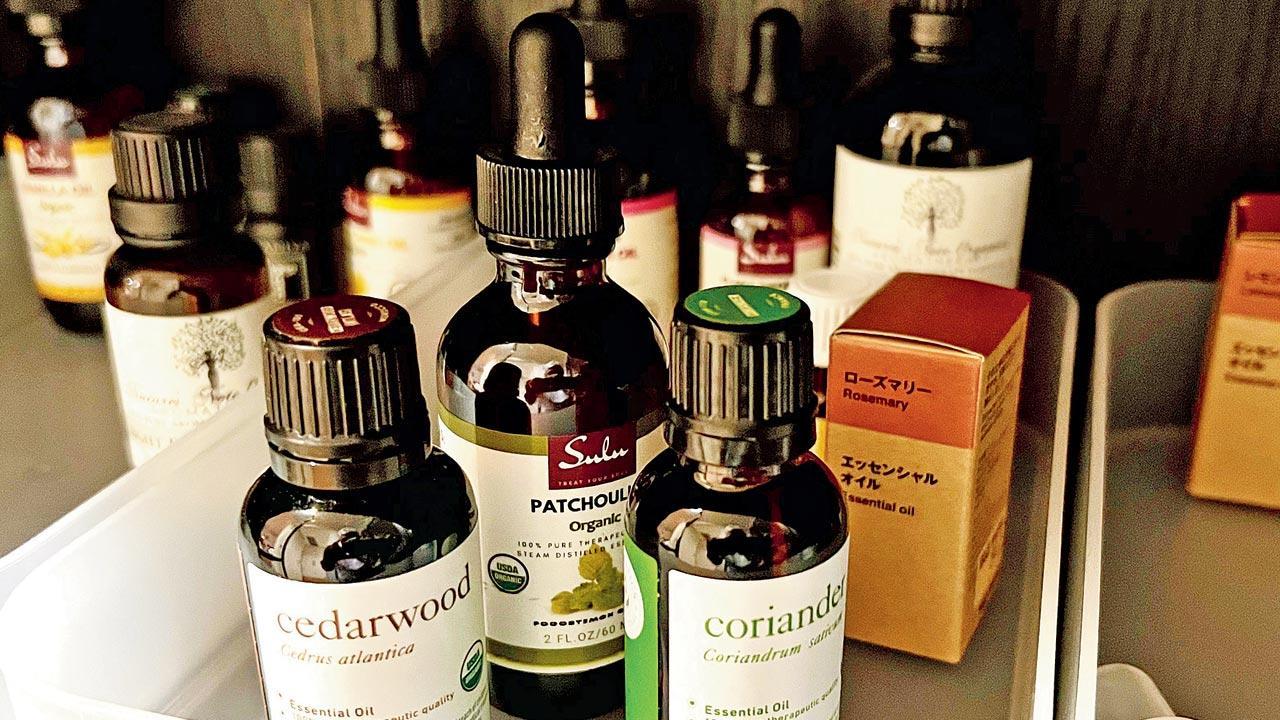Their aromas drew me first. Now I know that essential oils are the botanical equivalent of atom bombs. They deserve awe and respect

My dark cupboard—brimming with essential oils, hydrolats, carrier oils and bottles of cobalt blue or deep amber that block light—is my mysterious chamber of secrets
 Today’s inspiration is a dark wooden cupboard with glass doors that a truck from IKEA delivered three days ago. I have spent an afternoon arraying it neatly with my growing arsenal of essential oils, hydrolats, carrier oils and bright bottles of cobalt blue or deep amber that block light.
Today’s inspiration is a dark wooden cupboard with glass doors that a truck from IKEA delivered three days ago. I have spent an afternoon arraying it neatly with my growing arsenal of essential oils, hydrolats, carrier oils and bright bottles of cobalt blue or deep amber that block light.
ADVERTISEMENT
By the end of the year, I will have seven carrier oils you certainly don’t have in your larder, such as avocado oil, Moroccan Argan oil, grapeseed oil and South African marula oil.
Into these I will drip mathematical drops selected from my 35 highly concentrated essential oils including ones you have never heard of like opopanax (imagine camphor with an edge of peppermint) and palmarosa (rose flirting with lemon).
My dark cupboard is my mysterious chamber of secrets. Though the oils are in tightly sealed bottles, their molecules escape and mix. A soft wave of fragrance washes over me every time I open the doors, at the edge of an enchanting universe that can be sensed but never described.
The most thrilling part of my treasure trove is a 10-ml bottle of Rose Otto essential oil. Authentic Rose Otto comes from Bulgaria, where it grows exclusively in a valley of 240 square kilometres at an altitude of 396 metres near the mountain town of Kazanlak. About 60,000 of these roses will yield a single ounce (30 ml) of Rose Otto essential oil.
Also Read: Why Palestine haunted FIFA World Cup
That one ounce would cost $874. I use a cheaper substitute from a cheaper rose. I cannot afford the original.
I also cannot describe the original. And that is why I’m writing the first of this three-part eulogy to a world of scents and fragrances I am tiptoeing into—a world quite beyond words.
Try it for yourself. Describe the smell of a rose. I guarantee you will fail. Try any other scent—jasmine, turpentine, sweat, toothpaste, a burp—and you will still fail.
As a writer, my fascination with words goes back to school days when one established supremacy by flaunting words like ersatz, bespoke and triskaidekaphobia. It has taken age and humility to realise that our languages do not equip us to capture the stories our noses tell us. You could say something smells like jasmine but for the life of you, you could not tell me what the jasmine smells like.
Smells shapeshift. I’m not even sure that you smell what I smell. When friends come over, I allow them a sniff of my patchouli essential oil, so widely used in Ayurvedic skin and hair potions. In just a week, I’ve heard oil being compared to a lemon, wet earth, green leaves, kitchen spices and flowers. Patchouli smells different to everyone. You have the same six million smell receptors up your nose as I do but my rose is still not your rose.
According to Ed Yong, who won the Pulitzer Prize for explanatory writing during the COVID-19 pandemic, English has only three dedicated words for describing smells: stinky, fragrant and musty.
To Yong, the absence of smell words in English is a WEIRD problem—pertaining to western, educated, industrial, rich and democratic cultures. You wouldn’t face this problem if, for instance, you were one of the Jahai people of Malaysia. From childhood, you’d have been using dozens of specific smell words that don’t exist in any other tongue.
Like ltpit, which describes the pleasant, popcorn-like smell of a certain shaggy otter called a bearcat. A Jahai can also recognise ltpit in some soaps, flowers and even the intensely stinky durian fruit.
The only English smell word I believe would represent the exact same scent to everyone is petrichor, the word for the subtle, almost spiritual aroma of wet earth after the first rain.
Beyond this, my pen runs dry. So where do we begin with the words?
My dark cupboard of mystery, full of fragrant bottled genies, is my world beyond words. I will tread softly in here to train my nose, play with these bewitching molecules, discover how these powerful drops can change us—body, mind and soul.
Like ordinary mortals and butterflies, I was first drawn to essential oils because of their aromas. In a matter of weeks, I have learnt that these oils are the botanical equivalent of atom bombs. They deserve awe and respect.
My first aromatherapy lesson came three days ago when I lifted a pressure cooker off a hot stove, placing a hand on the base and instantly burning two fingers severely.
The pain was searing. Within seconds, the fingers were red, inflamed and on fire. I washed them in cold water, I smeared minty toothpaste over them, all to no avail.
And then I remembered my essential oils. I found instructions in one of my new books. Six hours later, as the sun set in Bangkok, my fingers were as normal as they had been when I woke that day. No pain, no inflammation, no peeling and no blisters.
Come back next week and I’ll tell you what my essential oils did for me.
You can reach C Y Gopinath at [email protected]
Send your feedback to [email protected]
The views expressed in this column are the individual’s and don’t represent those of the paper
 Subscribe today by clicking the link and stay updated with the latest news!" Click here!
Subscribe today by clicking the link and stay updated with the latest news!" Click here!







